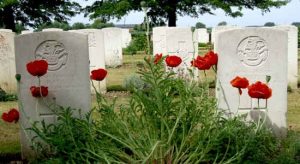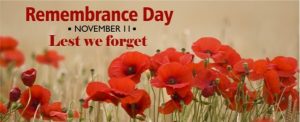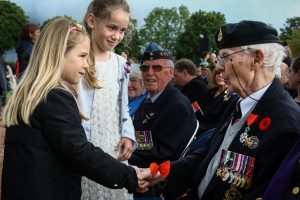Remembrance & Challenge
November 10, 2019 - 6 minutes readWe were honoured to have Canadian Armed Forces veteran and BICS parent Ron Silva speak at our School’s Remembrance Day Ceremony on Friday, November 8. We wanted to share his words beyond the Ceremony so they are published below.
November 8, 2019
Thank you for inviting me to speak to you today about Remembrance Day and Canada’s veterans.
Veterans are Canadians who serve, or have served, our nation in the Canadian Armed Forces. Veterans may have served in the Navy, the Army or the Air Force. A serving veteran can be recognized by their uniform. A veteran who has served in the past might be recognized by medals that they wear on the left of their chest, such as these medals from my service in the Canadian Army.
In order to protect the safety and freedoms that most Canadians enjoy, our nation’s veterans have sometimes been sent far from home to other countries where there are wars and armed conflicts. More than 118,000 Canadians have died in those wars and conflicts, and many more have suffered injuries, both physical and mental.
Every year on November 11, Canadians pause to remember all veterans who have served, and continue to serve our country. But most importantly, we remember the 118,000 Fallen veterans who sacrificed their future for our safety and freedoms.
Our nation’s Fallen veterans have left mothers, fathers, children and other loved ones to grieve their passing, sometimes over many generations. Injured veterans and their families may endure a lifetime of extraordinary challenges.
On Remembrance Day, we remember the sacrifices made by our Fallen and injured veterans, and their families, but we should also reflect on what those sacrifices mean for us.
This coming Monday will be the one-hundredth year that Canadians have observed Remembrance Day. Originally known as Armistice Day, it began in 1919 as a way to remember Canada’s great losses during the First World War. This is the origin of the traditions and symbolism, such as the Red Poppy, John McRae’s poem “In Flanders Fields”, and the Two Minutes of Silence.
Almost every Canadian community was affected by the First World War, including Bowen Island. We remember the five Fallen of our community at the Cenotaph near the ferry terminal.
However, Remembrance Day also commemorates the Fallen and injured veterans of the Second World War, the Korean War, many United Nations peacekeeping missions, and, most recently, the War in Afghanistan. Let’s also acknowledge that more than 2,000 members of the Canadian Armed Forces are currently serving overseas to promote peace in regions of armed conflict.
As a young soldier many years ago, I have memories of Remembrance Days where the veterans of the First and Second World Wars, standing tall and proud in their ranks, would greatly outnumber the serving Canadian Armed Forces members. Sadly, all the veterans of the First World War have now passed. From more than a million Canadian veterans of the Second World War, only 40,000 are still with us, and their average age is 94. But it was a great privilege during my service to have been able to speak with many of these veterans. From all those conversations, I remember most clearly their hope that the sacrifices and legacy of their Fallen comrades will never be forgotten.
If these veterans could be here today, they would ask you to do two things to honour Canada’s 118,000 Fallen veterans. One thing is easy but the other is challenging. The easy thing is taking the time every November 11th to remember our nation’s Fallen veterans who sacrificed their future for our safety and freedoms, as well as reflecting on what that legacy of safety and freedoms means for you and your community.
The more challenging thing is to promise that, on every other day of the year, you will work together- in a small way or big way – to build upon that legacy and towards a Canada and a global community where all people – not just some or most – enjoy the benefits of safety and freedoms. If you accept that challenge and work together toward that goal, then you will begin to see a future where war and armed conflict become relics of the past. A future of global peace that you imagine and create together would be the greatest honour that you could give our nation’s Fallen veterans.
From the poem “In Flanders Fields”:
“To you from failing hands we throw
The torch; be yours to hold it high.
If ye break faith with us who die
We shall not sleep, though poppies grow
In Flanders fields.”
Ron Silva – November 8, 2019


0 Comments